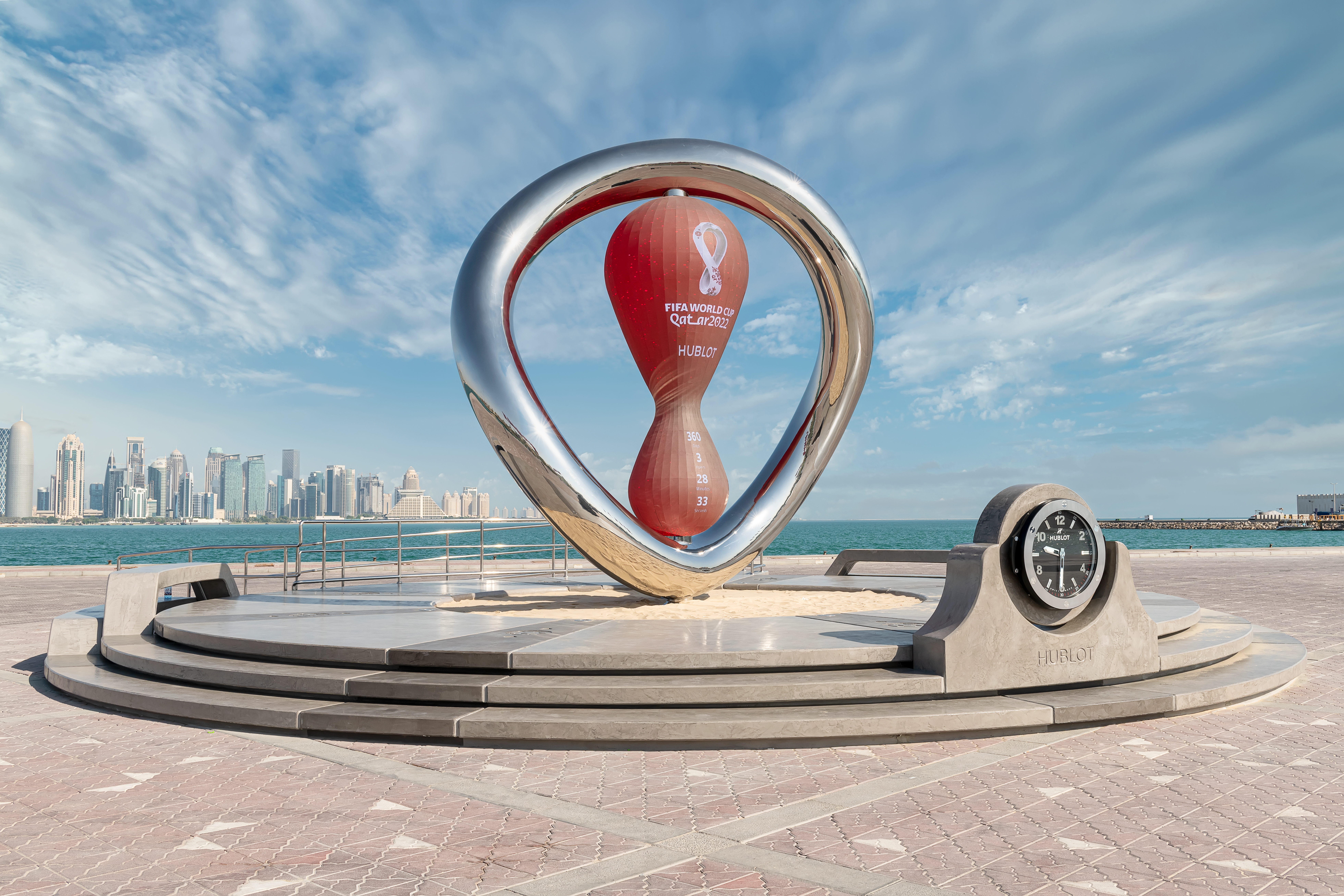
An England flag is hanging from my balcony overlooking The Pearl Island in Doha; the anthemic ‘It’s Coming Home’ is playing on repeat over the speakers. Face paints and wigs are ready in the bathroom; football shirts have taken pride of place in the wardrobe. Two days out from the start of the greatest football tournament on earth, the FIFA World Cup, and like millions of fans around the globe I’m counting down to kick-off.
Qatar’s hosting of the first ever World Cup tournament in Middle Eastern history is finally coming to fruition, and having lived in Doha for the past seven years, I’ve witnessed first-hand what this means to the country and its people. Qatar stands ready to embrace its duties as host nation but despite its repeated assertions that the tournament will be welcoming to all, excitement has been muted by the negative media directed at the country.
As a London-born liberal female, many of these stories run counter to my lived experiences in Qatar; with vast swathes of coverage being written by journalists that have never visited Qatar; nor ever sat and conversed with a Qatari. As a single woman I have never felt unsafe or threatened here. On the contrary, I have enjoyed freedoms that I can no longer take for granted elsewhere – walking home alone at night, dressing up without the fear of catcalling, at times even leaving my door unlocked. Through my work, I have encountered inspiring, pioneering, creative individuals from whom I have learned a great deal. I admit to having known very little about Qatar before relocating here and the process of discovering the country’s historical and cultural tapestry has been illuminating. Exploring and appreciating different landscapes, both physical and philosophical, is, for me, what travel is all about. I have always been made to feel welcome here and at home. I have had enlightening, and at times challenging, discussions with Qatari friends about key issues on which there is a divergence of opinion; but these are conversations – not arguments or dismissals. They are dialogues; and dialogue is a precursor to understanding on both sides. Such is the scale of the current campaign directed against Qatar that even the most vocal among us have felt hesitant in coming forward to share truths such as this. But share, we must. Now is not the time to stay quiet, for that silence is a deafening perpetuation of a narrative that is not our own.

In the twelve year build-up to the tournament, Qatar has faced scrutiny over its treatment of foreign workers. Far from shying away from such criticisms, His Highness Sheikh Tamim bin Hamad Al Thani, the Amir of the State of Qatar, has listened to global outcry and taken action. Speaking to Qatar’s legislative council, he stated that those early criticisms had been dealt with “in good faith” with the ruler considering “some criticism positive and useful, helping us to develop aspects of ours that need to be developed.” In 2020, Qatar announced landmark changes to its labour laws, including the abolishment of the kafala system – scrapping the need for workers to obtain their employer’s permission before changing jobs, becoming the first country in the Arab Gulf region to enact such measures. Additional policies were introduced too, including the removal of exit permits, previously required by employees to leave the country; and the introduction of a minimum wage for migrant workers, becoming the second country in the Gulf region to implement this, after Kuwait.
These historical reforms, designed to ‘transform social, human, economic and environmental legacies’, have been largely ignored in media reports. Rather than accepting such measures as demonstrable gains to workers’ rights and using them as a means of continuing a conversation that had already begun to yield concrete change – to push, for example, for an increase in the minimum wage, greater intervention in the remuneration of delayed or unpaid wages, and improved living conditions; all of which must be addressed – many commentators dismissed them as mere ‘window dressing’. Given the levels of rising unemployment, homelessness, food banks, and child poverty, as well as the unsympathetic treatment of migrants in many parts of the world, including in countries most vocal in opposing Qatar’s hosting of the tournament, it’s not difficult to see why criticisms of this sort have been taken as evidence of double standards.
In some outlets, criticism moved beyond calling for change and into far more dangerous territory. A caricature published last month in Le Canard enchaîné depicting Qatari footballers as terrorists elicited uproar across the Middle East but barely a murmur abroad. Under the guise of satire, tropes bound up in Islamophobia – including weaponry, balaclavas, and aggressive physical attributes such as dark, menacing eyes and angry, furrowed brows – have played into a wider history of anti-Muslim sentiment. Players that have dedicated their lives to securing a coveted spot on the national team of Qatar are reduced to cartoonish figures chasing a football in the sand while carrying machetes, guns and rocket launchers. Surely these professionals, like their international counterparts, are deserving of respect?
Worryingly, much of the negative press focused on Qatar has adopted an “us” and “them” mentality; devoid almost entirely of shared common humanity. The boldest statements seem fuelled by a belief in the superiority of one way of life over another, and have taken on a tone less reflective of reportage and more akin with cultural imperialism. In hosting the World Cup, Qatar has not agreed to forego its religious and cultural history in favour of a western narrative, nor to have another culture and system of beliefs superimposed upon it, but rather to share its own narrative with visitors and to welcome football fans, each from their own cultural background, in the spirit of inclusiveness and reciprocity.
Depictions of Qatari women as silently compliant entities in a male dominated society have also abounded in such narratives. This, to those like me that work with Qatari females on a daily basis, is a woefully inaccurate reading of the role that women play in the nation’s narrative. Voiceless? Tell that to the Qatari Businesswomen Association, established over twenty years ago to enhance women’s contribution to Qatar’s economic activity; or the many thousands of Qatari women that have full ownership of companies in Qatar. Tell it too to the female CEOs, CFOs, managers, and staff that work across industries as diverse as healthcare, beauty, finance, fashion, tourism, real estate, trade, engineering, and construction. And whilst you’re at it, tell it to the 1,078 Qatari women who enrolled in the 2019-20 academic year across Qatar Foundation’s universities, constituting almost 75 per cent of Qatari students registered – yes, that’s three times as many women as men. These facts have received little, if any, coverage, perhaps because they are inconvenient truths that do not fit the presupposed narrative.
In reality Qatar is proactively working to ensure even greater gender equality, with female empowerment a key pillar in its National Vision 2030. Strategies that promote women’s right to work and simultaneously enhance their social protection are testament to Qatar’s focus on such empowerment, a tenet inspired directly by the country’s female leadership. Her Highness Sheikha Moza bint Nasser, a pioneering voice across education, has spearheaded reforms in Qatar and globally through educational initiatives including Qatar Foundation and Educational Above All (EAA), a foundation that works to ensure inclusive and equitable quality education for vulnerable and marginalised people especially in the developing world. Collaborating with international partners, EAA has already secured over USD 2.2 billion in funding to provide educational opportunities, technology-enabled resources, remote learning facilities, scholarships, and school seats for millions of children worldwide.
Her daughter, Her Excellency Sheikha Al Mayassa bint Hamad bin Khalifa Al Thani, the Chairperson of Qatar Museums, has been responsible for welcoming world-leading international and regional artists to Qatar and for shining a spotlight on emerging talents practising within the country. At the Qatar Economic Forum, powered by Bloomberg, held in Doha earlier this year, she spoke eloquently on the idea that Qatar is “open to the world”, and called on visitors in return “to be embracing and respectful to our culture.” The DNA behind much of her groundbreaking work across the arts has been to find synergies between cultures, as well as to platform and showcase diverse cultures with a view to championing understanding. Speaking at the Forum, she reiterated her desire for guests to “understand the roots of tradition” in Qatar and to let the world know that “we’re open for conversations.”
As Truman Capote once commented, however, “A conversation is a dialogue, not a monologue.” It requires participation and engagement. The FIFA World Cup is a monumental opportunity for both. My experiences in Qatar are just that – my own. I don’t expect people to take my word for it or to stop challenging perceived injustice anywhere in the world. Nor do I suppose myself in any way qualified to write on behalf of other individuals or communities, whom I believe should be part of this dialogue based on their own lived realities.
What I do urge, is that visitors come to Qatar in the spirit of openness, for that is the spirit in which all shall be received. For those seeking to understand a culture different to their own; for those who wish to experience an incredible country and its people away from the confines of a limited media narrative; for free-thinkers who want to make up their own minds; for those who still believe that conversations can unite rather than divide us; and for those, like me, who are excited to wear their jerseys and cheer on their teams at the greatest footballing tournament on earth, the ball is in your court.









